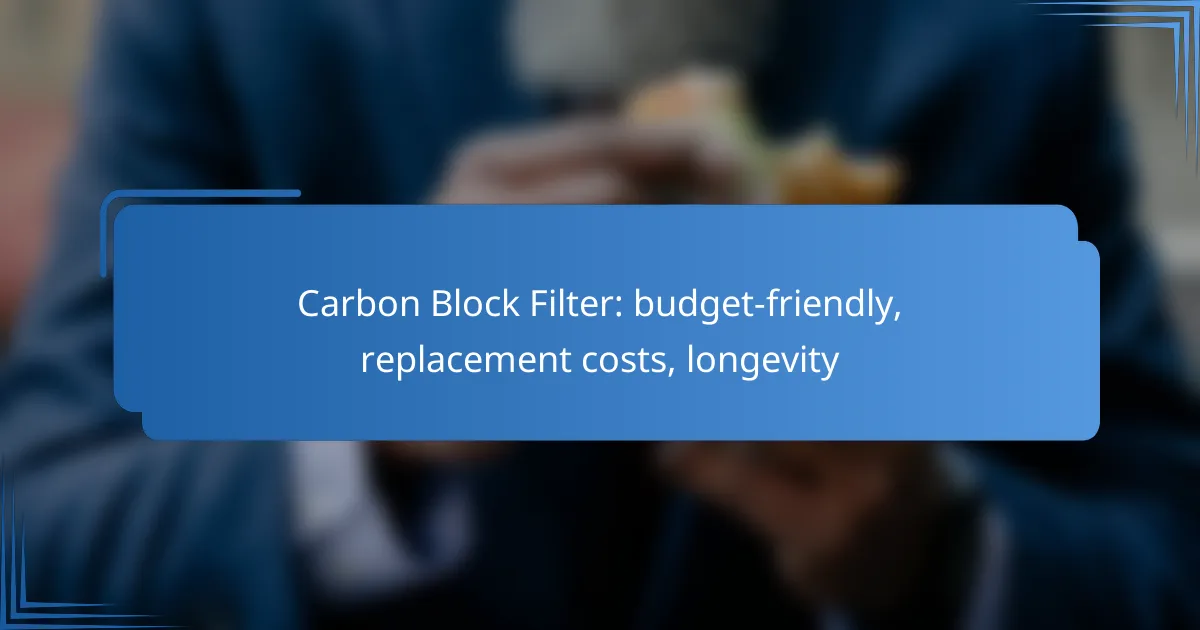Budget-friendly carbon block filters are an effective solution for reducing contaminants in water while remaining accessible for most households. With replacement costs that vary based on brand and type, these filters offer a moderate expense for ongoing maintenance. Typically lasting between six months to two years, regular replacements are crucial to ensure optimal filtration and clean drinking water.
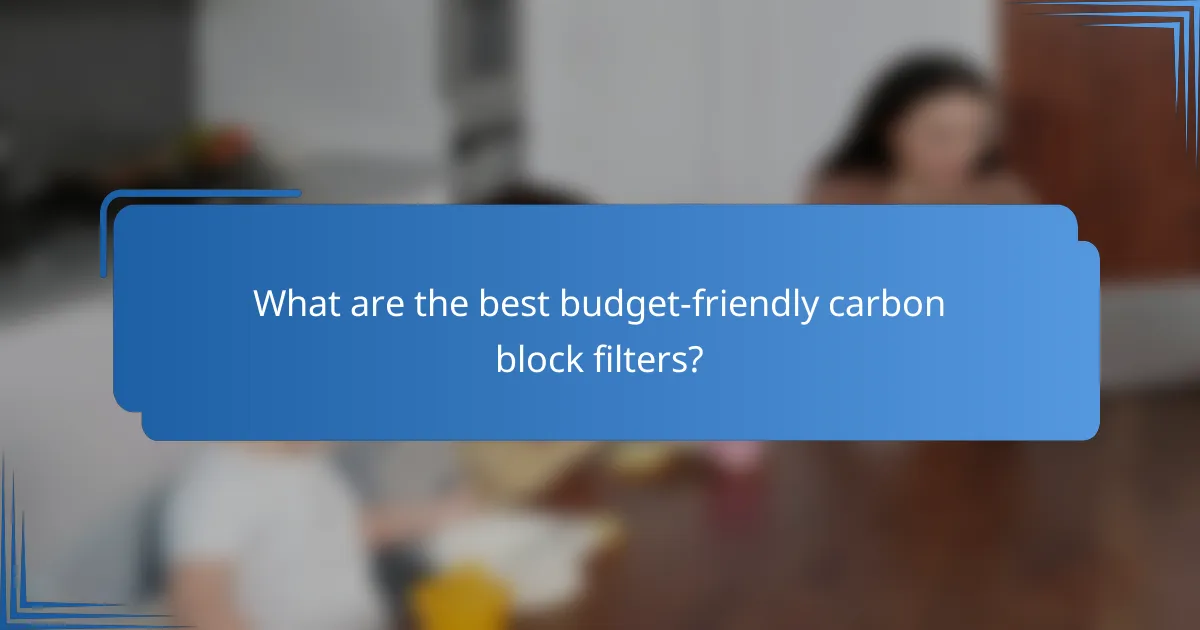
What are the best budget-friendly carbon block filters?
Budget-friendly carbon block filters effectively reduce contaminants in water while remaining cost-efficient. These filters typically range in price from low to moderate, making them accessible for most households.
APEC Water Systems Filter
The APEC Water Systems Filter is known for its affordability and high performance. It utilizes a multi-stage filtration process, including a carbon block that removes chlorine, sediment, and other impurities.
This filter generally costs between $100 and $200, depending on the specific model and features. Its longevity can reach up to 2 years with proper maintenance, making it a solid investment for budget-conscious consumers.
iSpring RCC7AK Filter
The iSpring RCC7AK Filter combines affordability with advanced filtration technology. It features a 6-stage filtration system, including a carbon block that enhances taste and removes harmful contaminants.
Prices for this filter typically range from $150 to $250. With regular filter replacements, it can last around 2 years, providing excellent value for money.
Home Master TMHP HydroPerfection
The Home Master TMHP HydroPerfection is a bit pricier but offers extensive filtration capabilities, including a carbon block filter. This system effectively removes chlorine, heavy metals, and other pollutants while improving water taste.
It usually costs between $300 and $400, but its longevity can exceed 5 years with proper care. This makes it a worthwhile option for those seeking a long-term solution without frequent replacements.
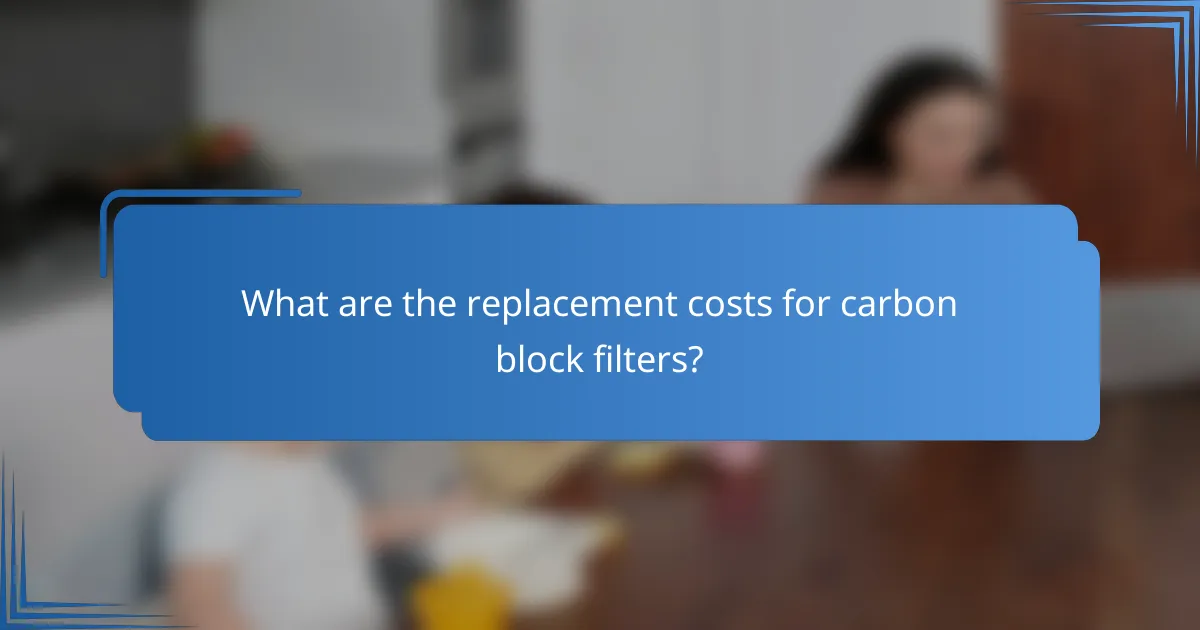
What are the replacement costs for carbon block filters?
Replacement costs for carbon block filters can vary based on several factors, including brand, type, and installation needs. Generally, consumers can expect to spend a moderate amount for replacements, making them a budget-friendly option for water filtration.
Average cost range
The average cost range for carbon block filters typically falls between $20 and $60 per filter. This price can fluctuate based on the filter’s size, quality, and specific features, such as additional filtration capabilities. For households that require multiple filters, costs can add up, but bulk purchasing may offer savings.
Brand-specific pricing
Brand-specific pricing can significantly influence the cost of carbon block filters. Well-known brands may charge a premium for their products, often ranging from $30 to $70 per filter. Lesser-known brands may provide similar quality at lower prices, typically around $20 to $40, making it worthwhile to compare options before purchasing.
Installation fees
Installation fees for carbon block filters can vary widely, depending on whether you choose to install the filter yourself or hire a professional. DIY installation usually incurs no additional costs, while professional installation can range from $50 to $150, depending on the complexity of the system. It’s advisable to factor in these costs when budgeting for replacement filters.
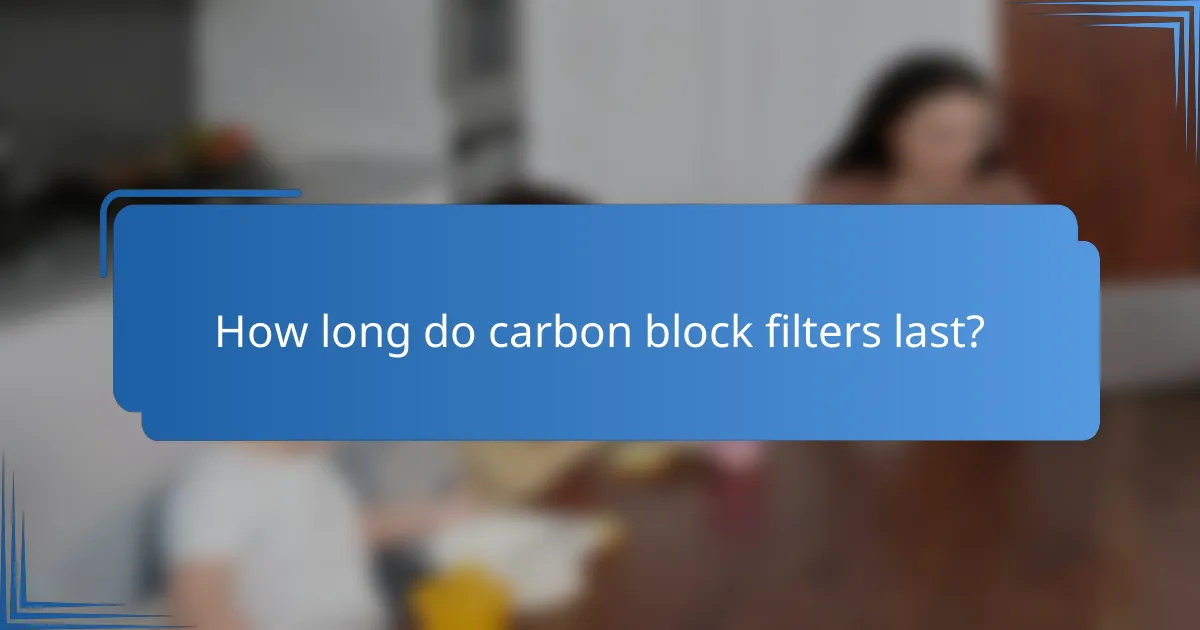
How long do carbon block filters last?
Carbon block filters typically last between six months to two years, depending on usage and water quality. Regular replacement is essential to maintain effective filtration and ensure clean drinking water.
Typical lifespan
The average lifespan of a carbon block filter ranges from six months to one year for standard household use. In some cases, filters can last up to two years if the water is relatively clean and the filter is maintained properly. It’s advisable to check the manufacturer’s recommendations for specific guidelines.
Factors affecting longevity
Usage frequency impact
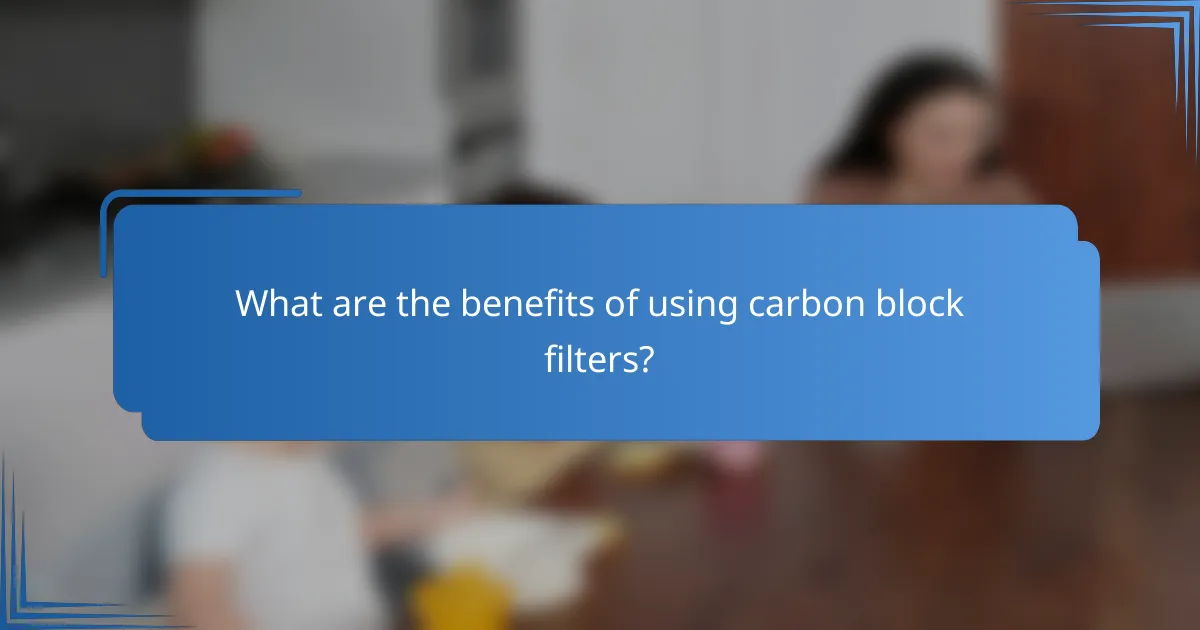
What are the benefits of using carbon block filters?
Carbon block filters offer several advantages, including enhanced water taste, effective contaminant reduction, and a positive environmental impact. These filters work by adsorbing impurities, making them a popular choice for improving drinking water quality.
Improved water taste
One of the primary benefits of carbon block filters is their ability to significantly enhance the taste of water. By removing chlorine, sediment, and other unpleasant flavors, these filters provide a cleaner and more refreshing drinking experience.
Users often report a noticeable difference in taste, making water more palatable. This improvement can encourage increased water consumption, contributing to better hydration.
Contaminant reduction
Carbon block filters are effective at reducing a wide range of contaminants, including heavy metals, pesticides, and volatile organic compounds (VOCs). They can typically remove up to 99% of these harmful substances, depending on the specific filter and its rating.
When selecting a carbon block filter, look for certifications such as NSF/ANSI standards, which ensure that the filter meets specific contaminant reduction claims. Regular replacement is crucial to maintain effectiveness, as clogged filters can lead to reduced performance.
Environmental impact
Using carbon block filters can have a positive environmental impact by reducing reliance on bottled water. This shift helps decrease plastic waste and lowers the carbon footprint associated with water transportation.
Additionally, many carbon block filters are made from sustainable materials, further contributing to eco-friendly practices. By choosing a filter, consumers can enjoy clean water while supporting environmental sustainability.
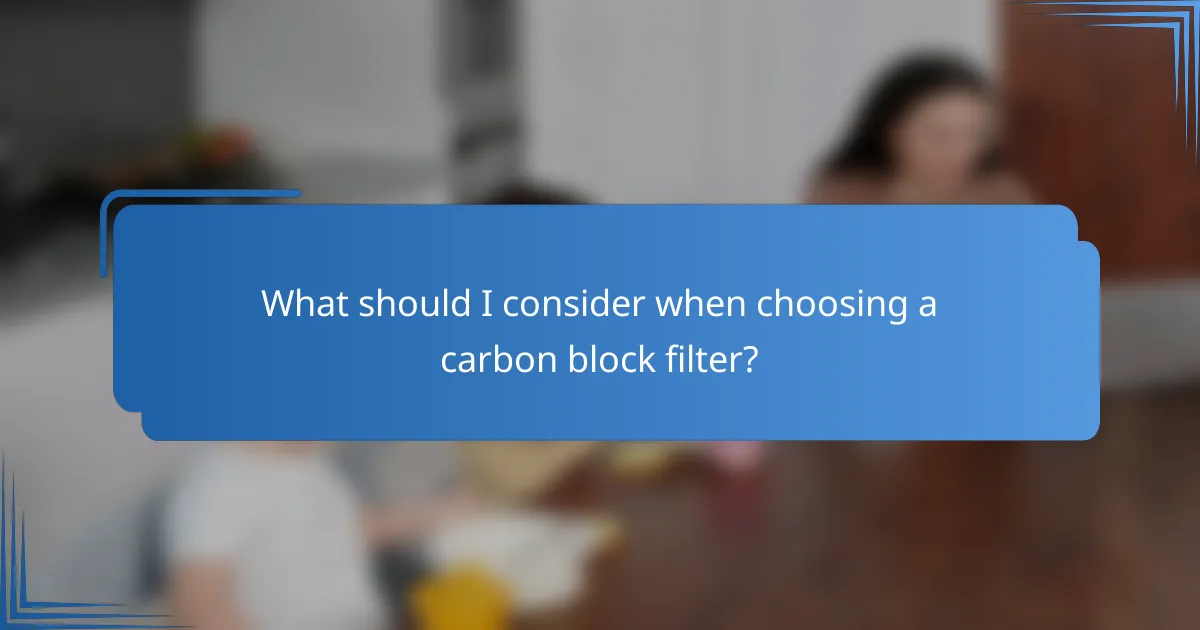
What should I consider when choosing a carbon block filter?
When selecting a carbon block filter, consider factors such as filter certifications, flow rate specifications, and size compatibility. These elements will help ensure that the filter meets your water quality needs and fits your system properly.
Filter certifications
Look for certifications from recognized organizations like NSF International or the Water Quality Association. These certifications indicate that the filter has been tested for contaminant reduction and meets specific performance standards.
Common certifications to consider include NSF/ANSI 42 for aesthetic effects and NSF/ANSI 53 for health effects. Filters that meet these standards are generally more reliable in providing safe drinking water.
Flow rate specifications
Flow rate specifications indicate how quickly water can pass through the filter, typically measured in gallons per minute (GPM). A higher flow rate means you can access filtered water more quickly, which is essential for households with higher water demands.
Most residential carbon block filters have flow rates ranging from 0.5 to 3 GPM. Ensure that the filter you choose can accommodate your household’s peak water usage without significant pressure drops.
Size compatibility
Size compatibility is crucial for ensuring that the carbon block filter fits your existing filtration system. Check the dimensions and connection types of the filter to confirm they match your setup.
Common sizes include standard 10-inch and 20-inch filters. Measure your current filter housing to avoid purchasing an incompatible product, which can lead to installation issues and reduced filtration efficiency.
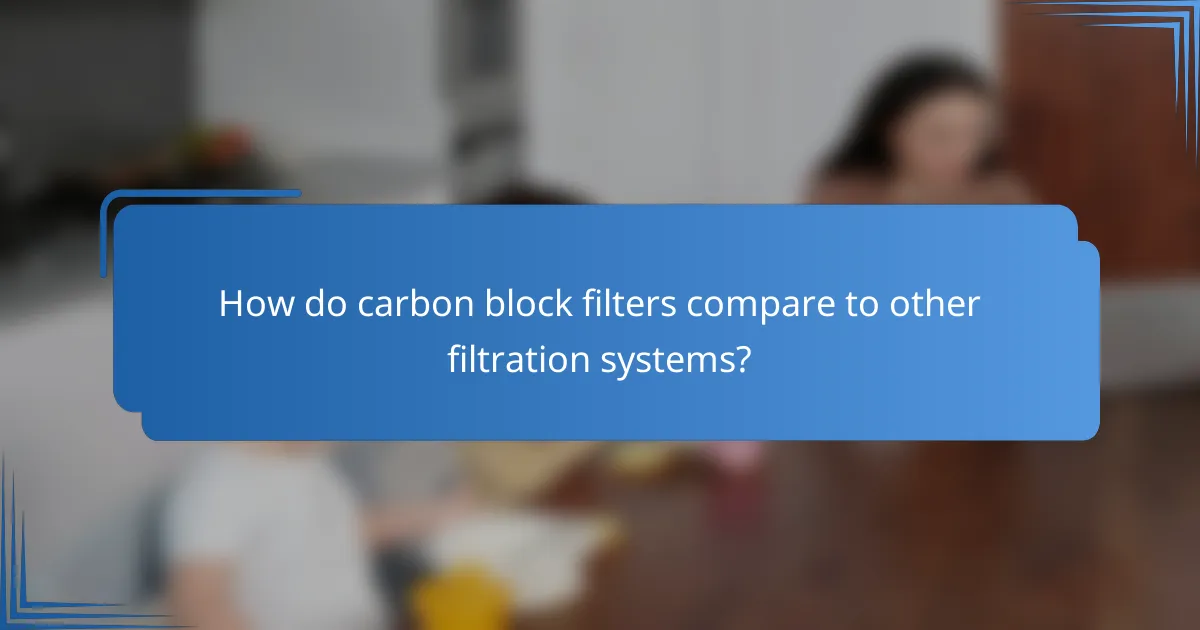
How do carbon block filters compare to other filtration systems?
Carbon block filters are effective at removing contaminants from water, often outperforming other filtration systems in terms of cost and efficiency. They utilize activated carbon to absorb impurities, making them a popular choice for budget-conscious consumers.
Budget-friendly options
Carbon block filters are generally more affordable than reverse osmosis or UV filtration systems. The initial investment for a carbon block filter can range from low tens to a few hundred USD, depending on the brand and capacity. Additionally, they require less maintenance, which can lead to long-term savings.
Replacement costs
Replacement costs for carbon block filters are typically lower than those for other systems. A carbon block cartridge can cost anywhere from 20 to 50 USD, with replacement intervals usually recommended every 6 to 12 months, depending on usage and water quality. This is more economical compared to the higher costs associated with replacing membranes in reverse osmosis systems.
Longevity
Carbon block filters can last several months to a year, depending on water quality and usage. While they may not last as long as some advanced filtration systems, their longevity is sufficient for many households. Regular monitoring and timely replacement are key to ensuring optimal performance and water quality.
